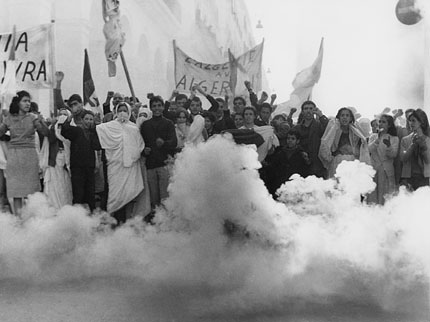
A cinematic painting that forms rough hewn shapes from masses of human beings, Gillo Pontecorvo's The Battle for Algiers presents the viewer with the first, and still one of the most important, images of the Algerian nation during its tumultuous birth. The fact that the film's 'main characters' are actually huge groups of people is still unique in narrative filmmaking and the success of this method is a testament to the abilities of the late Pontecorvo.
The documentary effect is maintained by a certain directorial distance- there is nothing cloying or precious about this film. It shows the facts of guerrilla warfare and military repression without sentimentalizing them. While it's clear that Pontecorvo supports the decolonization struggle, he is remarkably even-handed- when the Casbah is bombed we hear the same melancholy music cue as we do when the French bar is bombed later- the point being that all loss of life is tragic. Pontecorvo's is a deeply humane Marxism- Pauline Kael called him the most dangerous kind of Marxist; a Marxist poet.
Where Pontecorvo is especially humane is in his treatment of the French troops, who incredibly enough, relied on repression and torture mere years after experiencing the same under the Vichy regime. Pontecorvo doesn't excuse their actions, but still shows them as having been warped by the larger system, and forced into what can only be called a lousy job. He isn't entirely sympathetic, but in his lack of sentiment there is a certain fairness to all parties. He is showing us what happened, and the tragic breakdown of a society that led common people to do horrible things.
The distance also gives emotional resonance to several scenes- during the torture sequence, Ennio Morricone includes an organ cue that is sharply reminiscent of one of Bach's fugues, giving the scene a semi-religious atmosphere that is simply devastating. The scene is particularly effective because it comes at the end of a film that has shied away anything so emotionally evocative. Many viewers will weep at this scene.
Pontecorvo left the Communist party after the invasion of Hungary, and his Marxism isn't particularly doctrinaire. What we see in this film isn't a proof of an economic theory, but a deep interest in the ways that people try to improve their lot in life. While the film is often discussed now in relation to Islamic political movements and terrorism, what it shows through its distance is both the specificity of the Algerian war (which I would suggest isn't really a perfect match for any current wars) and the universal human dreams and weaknesses that formed its foundation.
No comments:
Post a Comment